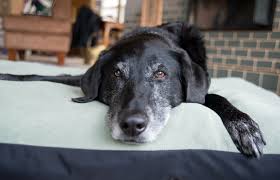Senior dogs have different care requirements than those of a younger dog. This fact probably doesn’t come as a surprise to anyone. But how do you know when your dog is considered to be a senior?
It really depends on the individual dog. In general, giant breed dogs age faster than smaller breed dogs. A Great Dane is considered to be senior by roughly 5-6 years old whereas a Chihuahua would likely only be middle-aged then, and probably not considered a senior until 10-11 years. Large breed dogs fall somewhere in between. A Golden Retriever might be considered senior by 8-10 years of age. Genetics, nutrition, environment; all of these play a role in how fast your dog ages.
What are some of the things to expect as your dog ages? Your dog may develop arthritis or other degenerative diseases that cause him to slow down. He may not be able to walk as far or play as long. He may tire more easily. He may have difficulty getting up or finding a comfortable position to sleep in. He may become reluctant to go up and down stairs or have difficulty getting into and out of the car.
Without proper care, dental disease can pose a problem, particularly for older pets. You may be surprised to learn that veterinarians find evidence of dental disease in many pets as early as 2-3 years of age. If nothing is done to care for your dog’s mouth, by the time your dog is a senior, he may even have lost some teeth. Dental disease can be painful, causing your dog to avoid or have difficulty eating his meals. This may result in weight loss and an unkempt hair coat.
Dental disease is certainly not the only disease that can lead to weight loss. Senior dogs frequently suffer from kidney disease, liver disease, heart disease and other conditions that may result in weight loss.
On the other hand, some senior dogs may have the opposite problem. Some dogs will become less active with age, essentially becoming couch potatoes, and will gain weight as a result. Obesity in a major health issue in dogs of all ages and senior dogs are no different.
What can you do to help your senior dog? Here are some tips:
Schedule regular visits with your veterinarian. Your dog needs to be examined at least yearly if it appears healthy, as many diseases are hidden and not apparent. Remember it is much cheaper to prevent disease than it is to treat it!
Ask for a body condition evaluation during each vet visit. Body condition is crucial to determining whether your senior dog is overweight, underweight, or at an ideal body weight. In fact, you should also ask your veterinarian to show you how to evaluate your dog’s body condition at home.
Feed your older dog a high quality diet. Also, learn to read the dog food label and choose a diet that is appropriate for your dog’s age and lifestyle.
Use food to keep your senior dog at his ideal body weight. Overweight dogs have a higher incidence of diseases such as diabetes, heart disease, skin disease, even cancer. Your veterinarian can help you choose an appropriate diet for your dog, especially since overweight dogs must be fed carefully to ensure that all nutrient needs are met while still allowing for weight loss. For instance, specialized diets that are lower in calories as well as those that are high L-carnitine are available for obese or overweight dogs. A diet with a carefully chosen carbohydrate or carbohydrate blend can also help keep your overweight dog feeling satiated.
Consider fortifying your senior dog’s diet with fatty acids such as DHA and EPA.They have been shown to be useful for dogs with mobility issues due to arthritis or other joint diseases. Supplements such as glucosamine and chondroitin are also beneficial for senior dogs.
Consider a special diet if your older dog has heart or kidney disease. For example, diets lower in sodium are sometimes advocated for dogs with heart disease, while diets which help control phosphorus, calcium and other electrolyte levels are given to dogs with kidney disease. Your veterinarian can help you choose the best food for your dog based on your dog’s individual situation.
Take care of your dog’s mouth. Brushing your dog’s teeth may seem like a silly idea but it can help keep your dog’s mouth healthy. If you cannot brush, consider dental treats and toys that help keep the teeth clean.
Exercise your senior dog. It can help keep your older dog lean and maintain healthy joints and muscles. However, tailor your dog’s exercise needs to his individual requirements. For a large breed dog, walking around the block is probably just getting started but for a tiny Chihuahua, a brisk walk around the block may be a long trek. If your senior is not used to exercise, start slow and gradually increase the intensity — and only after you’ve consulted a veterinarian. Also, be careful with short-nosed (brachycephalic) dogs on hot days.
Provide plenty of toys to keep your senior dog occupied. Food puzzles, for example, are not only useful for entertainment but for weight loss purposes as well.
Provide your older dog with special accommodations too. For instance, dogs with arthritis might benefit from soft bedding in the form of a special dog bed or towels/blankets on which to sleep. Ramps can be used to make stairs easier to navigate if they cannot be avoided. Even providing carpeting or rugs over hard-surface flooring can help your arthritic dog gain his footing and make it easier for him to get around.
